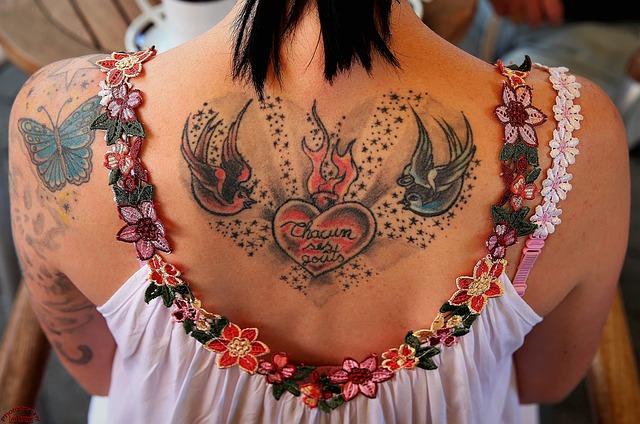
In today’s society, tattoos have become increasingly popular as a form of self-expression, art, and personal identity. While many individuals choose tattoos that hold deep meaning and significance to them, there is a concerning trend emerging – the rise of ignorant tattoos. This article aims to shed light on what exactly ignorant tattoos are and explore their impact on society. By examining the implications of these tattoos, we can better understand the social, cultural, and individual consequences they entail. Defining Ignorant Tattoos:Ignorant tattoos can be defined as permanent ink markings that display an individual’s lack of knowledge, understanding, or sensitivity towards certain subjects, cultural symbols, or historical events. These tattoos often perpetuate stereotypes, appropriative imagery, or offensive themes without the wearer fully comprehending their implications. Examples of ignorant tattoos include misinterpretations of cultural symbols, insensitive caricatures, or derogatory phrases. The Impact on Society:
- Cultural Appropriation and Insensitivity:
Ignorant tattoos contribute to the perpetuation of cultural appropriation, which occurs when elements of one culture are adopted by another culture, often without understanding or respecting their significance. By wearing tattoos that appropriate cultural symbols or imagery, individuals may unknowingly disrespect or trivialize the cultural heritage of others. This can lead to feelings of offense, marginalization, and erasure within affected communities, further exacerbating social divides.
- Reinforcing Stereotypes:
Ignorant tattoos that depict stereotypes reinforce harmful generalizations and prejudices, contributing to the perpetuation of discrimination and bias. For instance, tattoos portraying racial caricatures or offensive symbols reinforce negative stereotypes, leading to the marginalization and stigmatization of already marginalized groups. This can have profound psychological, emotional, and social consequences for those affected, hindering societal progress towards equality and inclusivity.
- Historical Misrepresentation:
Tattoos depicting historical events or figures without accurate knowledge or understanding can distort the narrative and perpetuate misinformation. Ignorant tattoos misrepresenting historical events, such as wars, revolutions, or social movements, undermine the importance of these events and disregard the experiences of those involved. This erodes the collective memory and understanding of crucial historical moments, hindering society’s ability to learn from the past and make informed decisions in the present.
- Personal and Professional Ramifications:
Ignorant tattoos can have personal and professional repercussions for individuals. In an interconnected world, where social media and online presence play a significant role, these tattoos can lead to negative perceptions, public backlash, and even the loss of opportunities. Employers, for example, may view such tattoos as a lack of cultural competence or sensitivity, impacting an individual’s career prospects. Additionally, individuals may face social exclusion or criticism from their peers, leading to a sense of isolation and emotional distress. Addressing the Issue:To mitigate the impact of ignorant tattoos on society, education, cultural sensitivity, and increased awareness are essential. Individuals considering getting a tattoo should thoroughly research and understand the cultural or historical significance behind their chosen design. Tattoo artists also bear a responsibility to educate their clients and ensure they make informed decisions. Society, as a whole, should foster an environment that encourages dialogue, empathy, and respect for diverse cultures, thereby discouraging the proliferation of ignorant tattoos. Conclusion:Ignorant tattoos have a profound impact on society, perpetuating cultural appropriation, reinforcing stereotypes, distorting history, and causing personal and professional ramifications. By recognizing the implications of these tattoos, we can work towards creating a more inclusive, respectful, and informed society. Through education, cultural sensitivity, and open dialogue, we can prevent the proliferation of ignorant tattoos and foster an environment that values diversity and understanding. Let us strive for tattoos that inspire meaningful conversations and reflect the rich tapestry of human experiences and perspectives, rather than perpetuating ignorance and harm.

Exploring the origins of ignorant tattoos and their cultural significance
Tattoos have long been an integral part of human culture, serving as a form of self-expression, cultural identity, and personal artistry. However, amidst the diverse and meaningful world of tattoos, a subcategory has emerged that challenges the traditional notions of body art – ignorant tattoos. In this article, we delve into the origins of ignorant tattoos and explore their cultural significance, shedding light on this intriguing phenomenon. Ignorant tattoos, often characterized by their simplistic and poorly executed designs, have gained both attention and controversy in recent years. While the term “ignorant” may imply a negative connotation, it refers to a specific aesthetic rather than the intelligence or knowledge of the individuals sporting such tattoos.
These tattoos exhibit a deliberate lack of technical skill and precision, embracing a raw and unrefined style that sets them apart from the more intricate and polished tattoos commonly seen. The origins of ignorant tattoos can be traced back to various cultural and artistic movements. One significant influence is found in the realm of folk art, where naivety and simplicity are celebrated. Folk art, rooted in traditional cultures, often features untrained artists creating works that reflect their personal experiences and beliefs. Ignorant tattoos draw inspiration from this folk art ethos, embodying a similar rawness and authenticity in their design. Additionally, the punk and DIY (do-it-yourself) subcultures have played a significant role in shaping the aesthetic of ignorant tattoos. These countercultural movements have always championed individualism, nonconformity, and a rejection of mainstream norms. Ignorant tattoos align with the punk and DIY ethos by deliberately rejecting conventional standards of tattooing, instead embracing imperfections, asymmetry, and unconventional subject matter. Cultural significance lies at the heart of ignorant tattoos, as they challenge societal norms and provoke thought and discussion. By intentionally deviating from the technical excellence often associated with tattoo artistry, individuals with ignorant tattoos subvert expectations and highlight the subjectivity of beauty and artistic value. In a world where perfection is often idealized, ignorant tattoos serve as a reminder of the beauty in imperfection and the power of embracing individuality.
Furthermore, ignorant tattoos can be seen as a form of social commentary and satire. Through their crude execution and unconventional subject matter, they provide a platform for expressing dissent, criticism, or irony. These tattoos often incorporate humorous or provocative imagery, allowing individuals to make bold statements or challenge prevailing cultural norms in a visually striking manner. It is important to note that ignorant tattoos are not without controversy.
Critics argue that the deliberately unskilled nature of these tattoos can perpetuate stereotypes about tattoo culture and reinforce negative perceptions held by some towards body art. However, proponents of ignorant tattoos argue that they offer a unique form of self-expression and artistic freedom, pushing boundaries and fostering a sense of community among like-minded individuals. In conclusion, exploring the origins of ignorant tattoos and their cultural significance reveals a fascinating facet of the tattooing world. Drawing inspiration from folk art, punk subculture, and the DIY movement, ignorant tattoos challenge traditional notions of technical excellence and beauty in favor of a raw, unrefined aesthetic. These tattoos serve as a platform for individual expression, social commentary, and cultural satire, sparking conversation and challenging societal norms. While opinions may differ, there is no denying the impact and relevance of ignorant tattoos in the ever-evolving landscape of body art and cultural expression.

Common misconceptions surrounding ignorant tattoos debunked
Tattoos have become a prevalent form of self-expression, with individuals from various walks of life adorning their bodies with intricate designs. However, in the vast world of tattoos, there is a category known as “ignorant tattoos” that often elicits confusion and misconceptions. In this article, we aim to debunk common myths and misconceptions surrounding ignorant tattoos, shedding light on their true nature and significance. By dispelling these misconceptions, we hope to foster a better understanding and appreciation for this unique form of body art.
- Ignorant Tattoos Defined:
Before we delve into debunking misconceptions, it’s essential to define what exactly constitutes an ignorant tattoo. Ignorant tattoos are typically characterized by designs or symbols that reflect a lack of knowledge, cultural sensitivity, or understanding. These tattoos may incorporate offensive imagery, racial stereotypes, or symbols that hold negative connotations. However, it’s crucial to note that not all tattoos that appear ignorant are intentionally disrespectful; they may simply result from a lack of awareness or education on the part of the wearer.
- Misconception: Ignorant Tattoos Are Always Intentionally Offensive:
One prevailing misconception about ignorant tattoos is that they are always intentionally offensive or disrespectful. While it is true that some individuals may purposefully choose offensive symbols or imagery, it is essential to consider the context and intent behind the tattoo. In many cases, people may acquire ignorant tattoos without understanding the cultural or historical implications associated with them. It is crucial to approach such tattoos with education and dialogue, rather than immediate judgment.
- Misconception: Ignorant Tattoos Reflect the Wearer’s Personal Beliefs:
Another misconception is that ignorant tattoos are a direct reflection of the wearer’s personal beliefs or values. It is important to remember that tattoos, even ignorant ones, can be a result of a fleeting moment, peer pressure, or a lack of understanding. It would be incorrect to assume that the wearer fully endorses the symbolism or message conveyed by an ignorant tattoo. Engaging in conversation and offering education can be more fruitful in helping the individual gain insight and make informed decisions regarding their body art.
- Misconception: Ignorant Tattoos Cannot Be Redeemed:
One prevalent myth is that ignorant tattoos are irredeemable and should be condemned outright. However, it is crucial to recognize the potential for growth, education, and transformation. Rather than perpetuating a culture of shame, it is more productive to encourage open dialogue and provide opportunities for individuals to learn from their past choices. Through thoughtful conversations and guidance, ignorant tattoos can become catalysts for personal growth and understanding.
- Misconception: Ignorant Tattoos Are Unworthy of Appreciation:
A common misconception is that ignorant tattoos lack artistic or cultural value and should be dismissed entirely. However, it is essential to separate the intention behind a tattoo from its artistic merit. Ignorant tattoos, despite their problematic origins, can still possess aesthetic appeal and technical skill. By acknowledging the artistic elements and appreciating the craftsmanship, we can promote a more nuanced conversation around ignorant tattoos while still recognizing the need for education and sensitivity. Conclusion:In the diverse realm of tattoos, ignorant tattoos often spark controversy and misunderstanding. By debunking common misconceptions surrounding ignorant tattoos, we can foster a more informed and inclusive dialogue. Understanding that not all ignorant tattoos are intentionally offensive, that they don’t necessarily reflect the wearer’s beliefs, and that there is potential for growth and redemption, we can approach this subject with empathy and education. By doing so, we encourage a more nuanced understanding of body art and promote a culture of inclusivity and respect.

How to avoid getting an ignorant tattoo: Tips and advice
In the world of body art, tattoos are a powerful form of self-expression. They can represent personal beliefs, cultural heritage, or simply serve as a stunning work of art. However, with the increasing popularity of tattoos, it is crucial to approach the process with knowledge and awareness. This article aims to provide valuable tips and advice on how to avoid getting an ignorant tattoo, ensuring that your body art reflects your intentions accurately.
- Research Tattoo Styles and Symbolism:
Before committing to a tattoo, it is essential to research different tattoo styles and their associated symbolism. Each tattoo style has its own unique characteristics, such as Traditional, Neo-Traditional, Realism, Watercolor, or Japanese. Understanding these styles will help you make an informed decision and choose a design that aligns with your vision. - Explore Cultural Appropriation:
Cultural appropriation is a contentious issue in the tattoo industry. To avoid ignorance, it’s crucial to respect and understand the cultural significance of specific symbols, patterns, or motifs you may wish to incorporate into your tattoo design. Take the time to educate yourself on different cultures and their traditions to ensure that your tattoo is respectful and avoids misrepresentation. - Find a Reputable Tattoo Artist:
Selecting a skilled and reputable tattoo artist is paramount to avoid ignorant tattoos. Look for artists with experience in the style you desire and check their portfolios to assess their artistic capabilities. Take the time to read reviews and seek recommendations from trusted sources. A talented artist will guide you through the process, offer advice, and ensure your tattoo aligns with your intentions. - Communicate Clearly with the Artist:
Effective communication with your tattoo artist is essential for a successful tattoo. Clearly express your ideas, preferences, and any concerns you may have. Share your research and discuss the symbolism or elements you want to incorporate. An open dialogue will help the artist understand your vision and provide valuable input to create a meaningful and culturally sensitive design. - Avoid Trendy or Impulsive Choices:
Tattoo trends come and go, but your tattoo will be with you for a lifetime. Avoid getting caught up in fleeting trends that may lose meaning or significance over time. Take the time to reflect on your chosen design and ensure it holds personal value to you. Avoid impulsive decisions and opt for a timeless tattoo that will age gracefully. - Consider Placement and Visibility:
Consider the placement and visibility of your tattoo carefully. Think about the professional and social environments you may encounter and whether visible tattoos align with your goals. While societal attitudes towards tattoos are evolving, certain industries or cultures may still hold prejudices. Placement on easily concealable areas allows you to have more control over who sees your tattoo. - Take Your Time and Be Patient:
Rushing into getting a tattoo can lead to regrettable choices. Take your time throughout the entire process, from design selection to scheduling appointments. Allow yourself to contemplate the design, seek multiple opinions, and sleep on your decision. Patience ensures that you make a well-informed choice and reduces the likelihood of ending up with an ignorant tattoo.

The rise of informed tattoo artists: Promoting education and awareness
The rise of informed tattoo artists: Promoting education and awarenessIn recent years, the tattoo industry has experienced a significant shift with the emergence of informed tattoo artists who are dedicated to promoting education and awareness. This transformative movement within the tattoo community is reshaping the industry and challenging the prevailing stereotypes associated with tattoos. By leveraging their knowledge, technical skills, and a commitment to staying up-to-date with the latest advancements, these informed tattoo artists are championing a new era of professionalism and creativity.
Education forms the bedrock of this movement, as tattoo artists recognize the importance of acquiring a comprehensive understanding of their craft. Beyond the basic artistic skills, they delve deep into the realms of dermatology, color theory, and tattoo history. By studying the science of the skin and the way it interacts with different pigments, informed tattoo artists can ensure the longevity and quality of their work. This knowledge empowers them to make informed decisions regarding needle depth, ink composition, and aftercare practices, ultimately leading to superior outcomes for their clients. Moreover, informed tattoo artists strive to raise awareness among both their peers and the general public. They actively engage in open dialogues about the cultural significance, symbolism, and potential risks associated with tattoos. Through social media platforms, blogs, and workshops, these artists share their expertise, debunk myths, and encourage responsible decision-making when it comes to getting inked. Their mission is to eradicate the prevalence of ignorant tattoos, where individuals may end up regretting their choices due to lack of information or poor execution.
The impact of informed tattoo artists extends beyond individual clients. They are reshaping the entire industry’s landscape by encouraging and facilitating ongoing education. Collaborative efforts with tattoo studios, conventions, and industry organizations have resulted in the establishment of formal training programs and certification processes. This professionalization of the field not only ensures a higher standard of craftsmanship but also provides aspiring artists with the necessary tools and knowledge to embark on successful careers. As the visibility and influence of informed tattoo artists continue to grow, their efforts are receiving recognition not only within the tattoo community but also from the broader public.
The stereotype of tattoos as mere expressions of rebellion or impulsive decisions is being shattered. Informed tattoo artists are showcasing the artistry, cultural significance, and personal stories that tattoos can encapsulate. This increased understanding and appreciation are fostering acceptance and inclusivity, as tattoos become recognized as legitimate forms of self-expression and artistic mastery. In conclusion, the rise of informed tattoo artists marks a pivotal moment in the tattoo industry. Through their dedication to education, technical expertise, and commitment to awareness, they are revolutionizing the way tattoos are perceived and created. By fostering a culture of professionalism, these artists are ensuring that the tattoo experience is not only visually stunning but also safe, informed, and emotionally meaningful. The future holds exciting possibilities as the world continues to unveil the transformative power of informed tattoo artists.








I look forward to further articles!